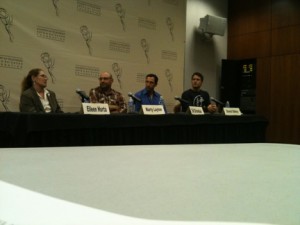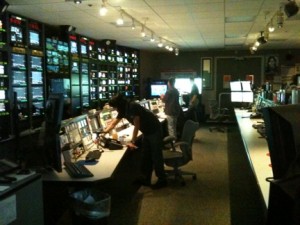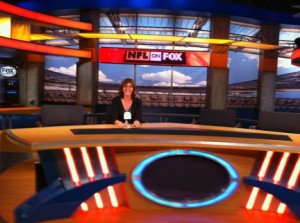Lessons from Los Angeles: Top Takeaways from the TV Academy (Part Two)

Below-the-Line Panel: Eileen Horta (Editor), Marty Layton (Director of Photography), Ed Ornelas (Editor), David Sibley (Music Supervisor)
Each year, the Television Academy of Arts & Sciences Foundation gathers twenty faculty from all over the U.S. and gives them incredible access to studio executives, writers, directors, editors, producers, attorneys, and SFX artists…with daily field trips to studio lots and live sets thrown in. We were fortunate enough to take part in this year’s Foundation Faculty Seminar, and wanted to share with Antenna readers some of what we gleaned during this whirlwind week:
7. The New Target Demographic to Reach is the Co-Viewing Audience.
Creators and network executives are looking out for shows that parents and kids can watch together. Game show guru Bob Boden of The Hub (a game show network that is a joint venture of Discovery and Hasbro) talked about how important it is to build contestants as characters, and establish a connection between them and the audience on newer game shows–lessons they learned from reality TV programming.
8. A 40-Person Conference Call Will Crash the Telephone System
If you want to see a showrunner get upset, bring up the topic of middle management. Taking notes from network executives is apparently one of the least enjoyable parts of a showrunner’s job. While sometimes a note is useful, writers usually experience notes as layers and layers of interference with their vision. One showrunner found himself on a 40-person conference call with MBA’s from both coasts who were suggesting changes in dialogue and reaction shots. There seems to be an inverse relationship between the amount of money a showrunner makes for a network, and the amount of attention they pay to the notes.
9. Channel the Boss.
Everyone in the writers room has a job because they are a gifted mimic of the series creator and his/her vision. The job of the comedy writer is not to write what he or she thinks is funny, but what the other writers in the room think is funny. The idea is to channel the showrunner’s voice. You must also learn and then follow writers room etiquette–unless you are as gifted as, say, Matt Weiner, and then you can piss off everyone in The Sopranos writers room and somehow still keep your job.
10. If You Get Lost on the Backlot, You Might Just Meet Don Draper
Sometimes getting lost feels like being found. Yes, he’s even more attractive in person.
11. TV Keeps the Lights on at Every Talent Agency
Not a surprise, but even as television struggles, it is important to be reminded that it is still the agencies’ bread and butter.
12. The Terms “Single-Cam” and “Multi-Cam” are Often Misnomers
A “three camera” show is probably using four or five cameras. A single camera show often uses more than one camera to film. While the terms are becoming less specific, the differences between the two forms of television endure: in cadence, tone, and even personnel. For a multi-cam comedy, the script is punched-up with 3-4 jokes per page, whereas on a single-cam series, a comedy can have fewer and more subtle jokes. Above- and below-the-line laborers usually make their careers in one or the other; it is somewhat rare to move back and forth between the two modes of production.

Holt channeling Bradshaw on the Fox Sports Sunday set.
13. In Order to Make It in the TV Industry, Learn TV History and get an Internship.
The Television Academy Foundation has a lot to offer researchers, students, and faculty. There is the fabulous Archive of American Television, which has over 700 interviews with TV pioneers and 2,500 hours of free content available. Arguably one of the best summer internships to get is one though the Academy of Television Foundation. And the best awards to win if you want to make it in television are the College Television Awards. Students, you should consider applying. And faculty, apply for the Academy of Television Foundation Faculty Seminar. It is a fantastic experience, made even better by the incredible Foundation staff. We look forward to reading your top takeaways next fall.


